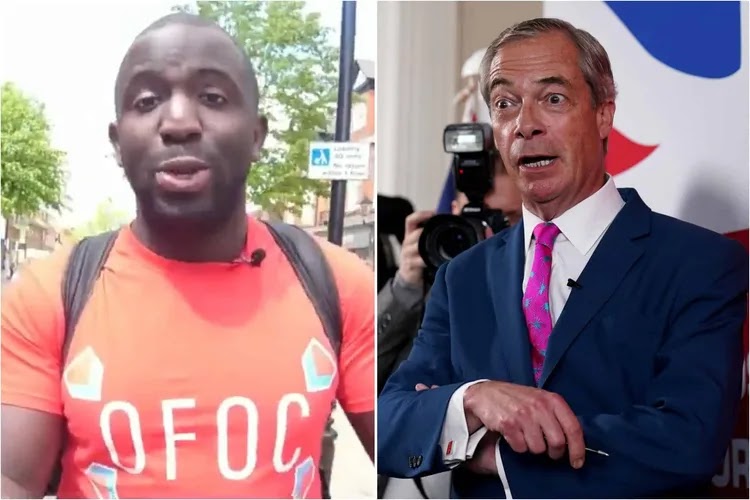Two-tier justice row erupts as police are told to treat black and white suspects differently with chief constables' report telling officers 'racial equity' does not mean 'treating everyone the same'
Proper news from Britain - News from Britain you won’t find anywhere else. Not the tosh the big media force-feed you every day!
A new two-tier justice row erupted last night as it emerged that police have been told to treat black and white suspects differently.
A report by policing chiefs declared that their commitment to 'racial equity' did not mean 'treating everyone the same or being colour blind'.
Instead, they called for 'equality of policing outcomes' for different ethnic groups by ending the racial disparity in the 'likelihood of people being criminalised'.
The 'Anti-Racism Commitment' also stated that officers must now 'consider cultural impact and community trauma when using their powers'.
Shadow Justice Secretary Robert Jenrick said the police chiefs' proposal was 'disgraceful', adding: 'Not only is it deeply unjust, it will also put the British public at risk.'
But a Labour source said last night there was nothing in the plan suggesting police should give 'preferential treatment to black people compared to white people'.
It came after a leaked report revealed that ethnic minority suspects are being given priority for judges considering bail because they may be at a 'disproportionately higher risk' of being held in custody.
And last night the Sentencing Council quango was forced to postpone controversial guidelines that could have led to criminals from minority backgrounds avoiding jail, after ministers threatened it with emergency legislation.



In the Commons, Shadow Home Secretary Chris Philp claimed the new rules would mean officers trying to engineer the same arrest and charging rates across different ethnic groups.
He said: 'Has the Home Secretary seen the police's Anti-Racism Commitment... which says that the police do not have to treat everyone the same regardless of race and calls for arrest rates to be artificially engineered to be the same across racial groups?
'Does she agree that this two-tier approach to policing is totally unacceptable?'
He urged Yvette Cooper to table an amendment to the Crime and Policing Bill to override the commitments set out by the National Police Chiefs' Council and the College of Policing professional body.
Ms Cooper said: 'The police already have to swear an oath on their impartiality and policing without fear or favour. That is the responsibility of every single police officer right across the country.'
And she added that the Government's row with the Sentencing Council showed it was 'very clear that there can be no preferential treatment for anyone in the criminal justice system'.
Mr Jenrick told the Mail: 'Facing my legal challenge and under immense pressure from the British public, the Sentencing Council have suspended their two-tier guidelines. This is an important victory for common sense.
'But the fight against two-tier justice under Two-Tier Keir continues. It is disgraceful that the police want to treat offenders from minority backgrounds more leniently than their white counterparts.'


Chief constables vowed to draw up a Police Race Action Plan in the wake of the 2020 Black Lives Matter protests that swept the world after the killing of George Floyd by a white police officer in America.
When their original report was launched three years ago, it descended into farce as senior officers could not agree on whether or not forces were 'institutionally racist'.
It also emerged that the chairman of a new board they set up to scrutinise police on race issues, criminal barrister Abimbola Johnson, had once said her 'ultimate aim is to create a societal system that no longer needs the police'.
Now the chiefs have triggered a damaging new row in a progress report on their plan.
NPCC chairman Chief Constable Gavin Stephens wrote: 'While our anti-racist aspirations extend to all those from ethnic minority and other diverse backgrounds, it is right that this plan continues its focus on black communities. Because it is the scale of trauma and distrust that generations of people from the black community feel towards the police that justify this as a top priority for our service.'
Programme director Alison Heydari, a temporary deputy assistant commissioner in the Met and the country's most senior black female officer, said the team had spoken to 'YouTube influencers' as well as black communities and civil society groups.
The report said 'the police service of England and Wales is committed to anti-racism and racial equity', going on to say 'it is not enough for us to not be racist or to claim not to be racist', and that instead 'anti-racism demands that we are proactive'.
A section on 'commitment to racial equity' stated that chiefs are seeking 'equality of policing outcomes for people from different ethnic groups by responding to individuals and communities according to their specific needs, circumstances and experiences'.



It added: 'It does not mean treating everyone 'the same' or being 'colour blind' (racial equality).'
Dr Alka Sehgal Cuthbert, of campaign group Don't Divide Us, said: 'The politics of "active anti-racism" damages rather than helps integration and encourages a stronger sense of grievance and victimhood which is ultimately self-defeating.'
The Labour source said the police chiefs' proposal 'simply argues that the police should be mindful of their history of difficult relations with black communities in our country when trying to manage those relations effectively today'.
The source accused Mr Philp of 'misrepresenting' the report to 'score political points'.





